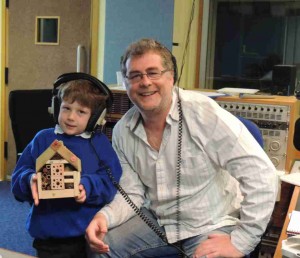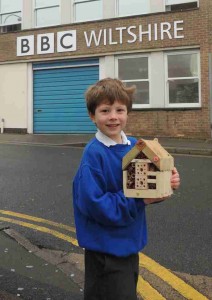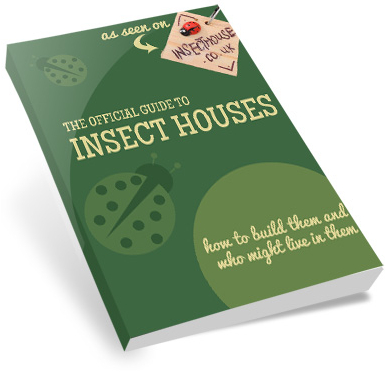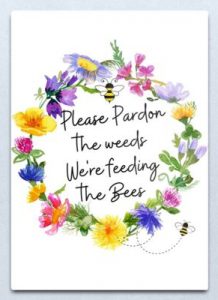Buzzing at the BBC
Interview Transcription
[Mark O’Donnell BBC] You may remember, last week, we were talking about a new shop, a new PopUp shop that’s opened up in Chippenham Emery Gate, the shopping centre there. It’s going to sell, locally sourced goods and provide employment for local young people as well. We were LIVE there, at the opening with BBC Wiltshire’s Karen Gardner.
Karen: Now this is part shop, and it’s part gallery really, accessible galleries, because there’s works of art here, and the thing that caught my eye are these insect houses, which are very trendy, and again, very fairly priced here. This is a real example of personal endeavor and ingenuity, isn’t it?
Woman: The people that run Ramsbury Tea have a little boy who’s six years old, and he really wants an iPad, and they told him that if he wants one, he has to go and earn it. So he’s making these beautiful little insect houses, which, of course, provide winter hibernation for all sorts of small creatures, and they’re for sale in the shop at a reasonable price, and they’re just really lovely.
Mark O’Donnell: Henry, who’s six, who made that insect house, has brought one into the studio for us to have a look at, and along with his dad, who he hasn’t brought in for us to have a look at, but has come with him, because clearly you’d be irresponsible to let him come in by himself. Henry, hello.
Henry: Hi.
Mark O’Donnell: And hello, Dad. Now you’ve brought the insect house with you.
Henry: Yeah.
Mark O’Donnell:Just tell us exactly how this works.
Henry: We started drilling holes in and we put these on to put the price tag so the other people know how much they cost.
Mark O’Donnell:Always important. It looks like a little house, doesn’t it? It’s got a little roof . . .It’s got holes drilled into it. Now, where do the insects live?
Henry: They can either live in these little pine cones, the, what are these called again, daddy?
Dad: They’re pine needles.
Henry: Insects can go into pine needles and also they can live in holes and these . . .
Mark O’Donnell:Right. So it’s got holes drilled into part of it, which are different sizes, so the insects can crawl in and live in those. The little pine cones, they’re stuffed into the corner there, and some pine needles look like a bit of thatch. How did you know how to make an insect house, or a house that insects would like to live in?
Henry: My daddy showed me how to do it, and we went to a place in . . . was it?
Dad: We went to a timber merchant to get some scrap wood. It’s all recycled timber.
Mark O’Donnell: So are you an entomologist, or did you just guess on what insects would like?
Dad: No, we did a bit of research on the web, and we made a ladybird house over the summer holidays as a project. And ladybirds moved in. They were hopefully moving in during the autumn to hibernate over the winter.
Mark O’Donnell: Now, the point, I was going to ask you, where would you keep an insect house, outside, inside?
Dad: Outside, in a corner of the garden. Just somewhere out of the way. Insects will go and live in piles of wood or under leaves anyway. This is just a way of making sure there’s a nice habitat for them.
Mark O’Donnell:It’s a beautiful idea, if you don’t mind me saying so. It’s an absolutely tremendous thing, because it’s got a little ladybird on the front. It says insect house, and it is about the size of one of those half-loafs of bread that you get. Sloped timber roof, and all kinds of different parts of it, I guess, that different colored insects will go for.
Dad: Yeah, because ladybirds just want a nice cozy corner to sleep in. Some masonry bees will drill their own holes quite happily. So we thought we’d just put a few holes and a few habitats in and put it in the garden and see who moves in, see what we get.
Mark O’Donnell:That’s, I guess, the nice thing about this, Henry, is that you’re not quite sure who’s going to move in, are you? It could be anyone.
Henry: Yeah. The first insect house we made, when we just finished it, a spider just moved in.
Mark O’Donnell: A spider’s your first tenant? Spiders moved in. I guess they will share. Some insects, obviously, are going to share with others, and they’ll work it out for themselves who . . .
Dad: They’ll do what nature does, yes.
Mark O’Donnell: Yeah. Who’s going to get eaten and who’s not. The idea is they hibernate over winter. You don’t think of insects, you think of hedgehogs and so forth, and tortoises, but you wouldn’t think that insects hibernate, but there’s got to be something to come alive next spring.
Dad: They do, especially ladybirds and solitary bees, lacewings. They’ve all had a very tough year this year. We were talking to a man who does apple pressing, and he says apple harvest is down . . .
Mark O’Donnell: Absolutely.
Dad: . . . by over half, because it’s just been too cold for bees to be out pollinating.
Mark O’Donnell: Very much so, as fruit, particularly horticulture’s really suffered, hasn’t it . . .
Dad: Yeah.
Mark O’Donnell:. . . because the winter. So I guess this would help, particularly because some people, in their own gardens didn’t get things for fruiting properly, this would help, because you’ve got a kind of ready supply of insects hanging around for polination
Dad: It’s just about giving insects a helping hand.
Mark O’Donnell: So, you helped make this, Henry. Okay.
Henry: Yeah, and you see lots of different insects like ladybirds, flowers, bees, and dragonflies on it.
Mark O’Donnell: That’s true, because you could get all kinds coming to live . . . . in this house, couldn’t you?
Henry: Yeah. All kinds of insects, and maybe you can get a small creature with eight legs like a spider.
Mark O’Donnell: Very good, well pointed-out there. Of course, a spider is not an insect, is it? It’s a . . . I’ll get it in a minute. Anyway, it’s an eight-legged creature, arachnid, isn’t it, not an insect? So you could get arachnids and insects. Now, you like insects, obviously? Do you like bugs?
Henry: Yeah, but not when they tickle me.
Mark O’Donnell: That’s a good point. But you don’t mind having one walk on your hand? Is that all right?
Henry: I only had one walking on my finger…
[Pause]
Mark O’Donnell: Okay, I’ll explain what happened in just one minute. The idea of why Henry suddenly stopped talking, because you heard a voice in your headphones there, didn’t you?
Henry: Yeah.
Mark O’Donnell: You heard . . . That person was talking to me, didn’t realise you’d be able to hear them as well. So, let’s ask you what that voice in your headphones said? Why are you making these, because you’re going to sell them in the shop, aren’t you?
Henry: Yeah. We should be able to sell them in the shop.
Mark O’Donnell: Yeah, and then what are you going to do with the money when you sell them?
Henry: We’re going to save them up. We’re going to save the money up and see if we can get enough money to buy an iPad. iPad 2.
Mark O’Donnell: iPad 2, quite right. Don’t want just any old iPad here, dad, is this, obviously, an interest in biology, an interest in getting young people to know about nature and stuff? Also seems to be, somebody came to you and said “I want an iPad,” and you said okay, well, you’re going to have to earn money to buy one then.
Dad: Yeah. Some of his friends’ families have got iPads, and the school has got some iPads. And he’s really taken with them. So he’s started hinting already as to whether Father Christmas might be good enough.
Mark O’Donnell: And you thought . . .
Dad: We thought, actually, it would be good to spread the word about insect houses and have people do their bit to help insects and creepy-crawlies. Also, we thought it would be a good pocket money project. Let’s see if we can earn enough money between us, and his mother and I said that we would do our bit to help if he put in a bit of effort as well. So he’s been helping me. I do the dangerous stuff like the drilling. He does the knocking of nails and he puts the screws in.
Mark O’Donnell: You can see . . . Do you mind if I pick it up, Henry? Is that okay?
Henry: I don’t mind if you pick it up.
Mark O’Donnell: Thank you very much. Let me just give you some idea that, this is a solid old piece of kit we’ve got going on here. So you’ve tied the idea together, that you could say, here’s an iPad, you’re tying the idea together of working, nothing for nothing, where things come from. It seems as though it kind of pulls together all kinds of ideas in a very simple and beautifully manufactured [lesson].
Dad: Oh, thank you for saying so. Yeah, we just thought it would be useful to learn that you can get things but you have to work for them. You have to put in a bit of effort.
Mark O’Donnell:Yeah. There’s all kinds of lessons to learned from this. It’s a brilliant and beautiful idea. What are these little tubes here, Henry? These ones here? Oh, it smells lovely as well.
Henry: Bamboos.
Mark O’Donnell: They’re little bamboo shoots. Oh, so they’re little tubes. So you can imagine a little earwig or something crawling in there.
Henry: Yeah, and maybe a grasshopper or a cricket.
Mark O’Donnell: Do you hope there will be particular insects? Do you have favourites that you’d like to come and live in your house? I mean spiders, ladybirds, grasshoppers?
Henry: Spiders may be the best.
Mark O’Donnell: Yeah, I think spiders are mainly the best, aren’t they? Yeah. They’re definitely my favorites, too. So you’ve been out to a timber merchant and got scraps so it’s all environmentally friendly?
Henry: Yeah.
Mark O’Donnell: You’re selling them in a PopUp shop. This is all very community minded, dad. You have to say, this is . . . Is this something you obviously think about as a family?
Dad: My wife’s selling some tea at the community markets, and the lady who runs the markets also runs the PopUp shop. She asked us if we’d like to put the tea into the shop, and then she saw Henrys’ insect houses and asked if she could have those as well. So it’s gone from a small project to something, we’re finding ourselves in shops, on the radio. We haven’t quite gone viral.
Mark O’Donnell: It’s going to happen soon. I noticed you have, right on the front of the insect house, the plaque on the front, I believe says, insecthouse.co.uk. So you have an international online web presence as well.
Dad: That’s my wife’s doing. She’s the web guru, so yes.
Mark O’Donnell: Insecthouse.co.uk, there’s the PopUp shop at Emery Gate if you’re in Chippenham Wiltshire, and you can get them from there or go to insecthouse.co.uk, because they’re absolutely beautiful things, and you’ve heard that you will be helping Henry save towards his iPad. What are you going to use your iPad for, Henry?
Henry: We’re going to use it for playing games on and maybe, if my dad wants to do some stuff on it, he could write stuff on iPads, because you can write stuff on iPads.
Mark O’Donnell: Are you going to let your dad borrow it if he wants to?
Henry: If he wants to.
Mark O’Donnell: Yeah, but when you’re not playing on it.
Henry: Yeah, but mainly every morning I might play on it.
Mark O’Donnell: We’ll see how it works, because it’s a fabulous tool, as we know. Properly used and regulated, the things that you can learn from them are absolutely extraordinary. And Henry, who knows what will happen? You could design a new insect house on it. You could do all kinds of stuff with it as well. You could have your mum with her website. The world’s opening up in front of you, Henry. Thank you very much for coming in, and thank you for showing us this beautiful insect house. It really is a lovely thing. I’ll get a picture of it and put it up on the Facebook page so that you can see it for yourselves. Dad, thank you very much, indeed.
Dad: Thank you.
Mark O’Donnell: Do you have to go back off to school, now, Henry? Because I suspect . . . what class are you in?
Henry: Yeah. Class 2.
Mark O’Donnell: Do you want to say hello to everybody at school?
Henry: How do you even do it?
Mark O’Donnell: You could just say, “Hello to all my friends and teachers and everybody”, something like that. Do you want to say something like that? Do you want to?
Henry: Maybe to my class.
Mark O’Donnell: Just say it into that microphone and everyone will hear.
Henry: What do I say again?
Mark O’Donnell:Just say, “Hello, it’s Henry.” Say, “It’s Henry. Hello to Class 2.”
Henry: Hello, it’s Henry from Class 2. Bye.
Mark O’Donnell: Yeah, that will do. Well done, Henry. Insecthouse.co.uk. Thank you very much, indeed, for coming in. BBC Wiltshire.



